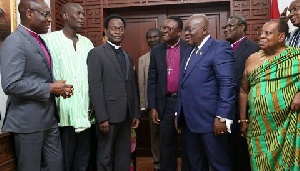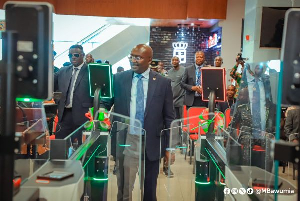Security expert, Prof Kwesi Aning, has said violence in Ghana’s politics is gaining ground and threatening the country’s peace because perpetrators go unpunished.
The Clinical Professor of Peacekeeping Practice at Kennesaw State University in Atlanta, USA, told GhanaWeb on Tuesday, August 11, 2020, that the "peace movement" – such as the National Peace Council, the Ghana Catholic Bishops Conference or the Christian Council – will have an uphill task diffusing tensions ahead of the December elections because “violence has become a currency”.
“Look at all the important people whose language is violent, disrespecting, threatening. MPs threatening others. Ministers shooting guns in public and there is no punishment neither by the statutory authorities nor the political parties which they are members,” Prof Aning gave a snapshot of the situation.
The Director of the Faculty of Academic Affairs & Research at Kofi Annan International Peacekeeping Training Centre (KAIPTC) told GhanaWeb that no “group of do-gooders called the peace movement” will make any significant impact unless law enforcement authorities are bold enough to crack the whip.
Prof Aning was speaking to GhanaWeb about Ghana’s security situation with four months to the December polls.
“What we are discussing is between the forces of darkness and the forces of light; and the forces of darkness is those who perpetrate violence, profit from violence and cannot be dissuaded to stop using violence,” he said.
He added: “If we look at what is happening as a rational choice [by politicians]…to use violence on the violence stock exchange, to negotiate, manipulate and position themselves for power and public office, the use of violence will in politics make sense.”
According to him, the politicians, who are in the minority have tested the pulse of the average Ghanaian and “know most people are docile; they think that it is the [ordinary Ghanaian] who should go out there and fight and lose our lives then if something positive comes, they will enjoy.”
Prof Aning said be backs a call by the Coalition of Domestic Election Observers (CODEO) for perpetrators of violence during the 38-day voters registration exercise to be punished.
The Electoral Commission’s process to compile a new electoral roll ahead of the general election in December met with sporadic violence.
The 38-day registration exercise and two days of mop-up witnessed two deaths with several acts of violence across the country.
Most of the violence involved supporters of the governing New Patriotic Party (NPP) and opposition National Democratic Congress (NDC).
A clash between supporters of the two largest political parties in the country on August 8, 2020, led to the death of one person at Nkrankwanta, a town in the Bono Region.
Member of Parliament for Awutu Senya East, Mavis Hawa Koomson, also fired shots at a polling station disrupting the process.
Again in the Bono Region, a 28-year-old teacher who graduated from college was stabbed to death at Banda, a border town in the region in what is suspected to be a mistaken identity.
Click to view details



General News of Thursday, 13 August 2020
Source: www.ghanaweb.com

















